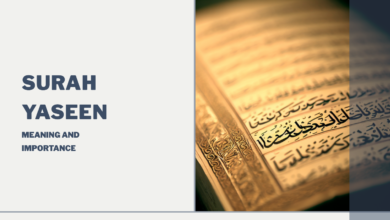Most Powerful Surahs in Quran
The Majesty and Influence of the Most Powerful Surahs in the Quran


Introduction
The Quran, the holy scripture of Islam, is a comprehensive and timeless guide for all aspects of life. Within its pages are numerous surahs (chapters) that hold deep spiritual significance and are believed to carry immense power and blessings. These surahs are not only recited for their linguistic beauty but also for the spiritual and psychological strength they provide to believers. In this article, we will explore some of the most powerful surahs in the Quran and delve into their significance in the lives of Muslims.
Surah Al-Fatiha (The Opening):
Surah Al-Fatiha is often referred to as the “essence of the Quran” and is recited in every unit of the Muslim prayer. Its seven verses succinctly encapsulate the core beliefs and principles of Islam, making it an indispensable part of a Muslim’s daily worship. This surah is a prayer for guidance, mercy, and forgiveness from Allah, establishing a strong connection between the believer and their Creator.
Surah Al-Baqarah (The Cow):
Surah Al-Baqarah is the second and longest chapter in the Quran, encompassing a wide range of guidance on various aspects of life, including social, economic, and legal matters. It is often considered a comprehensive guide for both individual and communal well-being. The surah contains stories of past nations, lessons to learn from their experiences, and verses that address matters of faith and ethics.
Surah Yaseen:
Surah Yaseen is known as the “heart of the Quran” due to its central position and the profound spiritual message it carries. This surah is often recited to seek Allah’s mercy, healing, and protection. It is believed to alleviate difficulties and bring comfort to those facing trials and tribulations.
Surah Ar-Rahman (The Beneficent):
Surah Ar-Rahman emphasizes the countless blessings of Allah upon His creation. Its repetitive refrain of “Which of the favors of your Lord will you deny?” serves as a reminder to humans of the bounties they enjoy and their responsibility to be grateful. Reciting this surah evokes a sense of awe and gratitude, deepening one’s connection with the Creator.
Surah Al-Waqiah (The Inevitable):
Surah Al-Waqiah discusses the Day of Judgment and the fate of individuals based on their deeds. It urges believers to reflect on their actions and strive for righteousness. This surah is often recited for seeking blessings and sustenance and is believed to protect against poverty.
Surah Al-Mulk (The Sovereignty):
Surah Al-Mulk emphasizes the dominion of Allah over all creation and the transient nature of worldly life. It encourages believers to contemplate the signs of creation and the purpose of their existence. It is believed that whoever recites this surah nightly will be protected from the torment of the grave.
Surah Al-Ikhlas (The Sincerity):
Surah Al-Ikhlas succinctly conveys the concept of monotheism, affirming that Allah is unique and beyond comparison. It encapsulates the essence of Tawhid (the belief in the oneness of Allah) and is often recited to seek closeness to the Creator and purification of the heart.
Surah Al-Falaq (The Daybreak) and Surah An-Nas (Mankind):
These two short surahs, often recited together, are known as the “seeking refuge” surahs. They are recited to seek protection from evil, harm, and negative influences. Muslims recite these surahs for personal and spiritual safety.
In conclusion, the Quran contains numerous surahs that hold immense power and significance for Muslims. These surahs are recited not only for their linguistic beauty but also for the spiritual strength, guidance, and blessings they provide. Each surah addresses different aspects of faith, life, and human nature, catering to the diverse needs of believers. Through the recitation and reflection upon these surahs, Muslims find solace, inspiration, and a deepened connection with their Creator. Whether seeking healing, guidance, protection, or a closer relationship with Allah, these powerful surahs continue to serve as a source of strength and hope for Muslims around the world.
Faqs of Most Powerful Surahs in Quran
What are the most powerful Surahs in the Quran?
The Quran is replete with powerful Surahs, but some that are often highlighted for their profound impact include Surah Al-Fatiha, Surah Yasin, Surah Al-Baqarah, Surah Al-Ikhlas, and Surah Al-Mulk.
Why are these Surahs considered powerful?
These Surahs hold deep spiritual meanings, addressing fundamental concepts such as the oneness of God, guidance, mercy, and accountability. They offer solace, guidance, and remind believers of their purpose in life.
What is the significance of Surah Al-Fatiha?
Surah Al-Fatiha is known as the “Opening” and serves as a foundational prayer recited in every unit of Islamic prayer. It succinctly encapsulates the essence of monotheism and is often referred to as the “essence of the Quran.”
Why is Surah Yasin considered special?
Surah Yasin is revered for its comprehensive lessons. It emphasizes the concept of life after death, divine mercy, and the stories of past prophets. It is often recited to seek solace and blessings.
What is the significance of Surah Al-Baqarah?
Surah Al-Baqarah, the longest chapter in the Quran, delves into various aspects of faith, law, guidance, and morality. It offers profound insights into the lives of believers, detailing various trials and lessons.
Why is Surah Al-Ikhlas important?
Surah Al-Ikhlas succinctly conveys the monotheistic belief in the oneness of God. It is often called the “Sincerity” chapter and holds great spiritual significance.
What teachings does Surah Al-Mulk emphasize?
Surah Al-Mulk highlights the magnificence of creation and the sovereignty of Allah. It encourages reflection on the world’s wonders and serves as a reminder of accountability in the hereafter.
How can one benefit from reciting these Surahs?
Reciting these Surahs with sincerity and understanding can bring spiritual comfort, guidance, and a sense of connection to Allah. They offer insights into the essence of Islam and help believers navigate life’s challenges.
Are there specific times or occasions to recite these Surahs?
While these Surahs can be recited at any time, some have recommended times and occasions. For instance, Surah Yasin is often recited for the sick, and Surah Al-Mulk is encouraged to be recited before sleep.
Can non-Arabic speakers benefit from these Surahs?
Absolutely. While understanding Arabic adds depth, translations and explanations are available in various languages. The spiritual and moral teachings of these Surahs transcend linguistic barriers.





